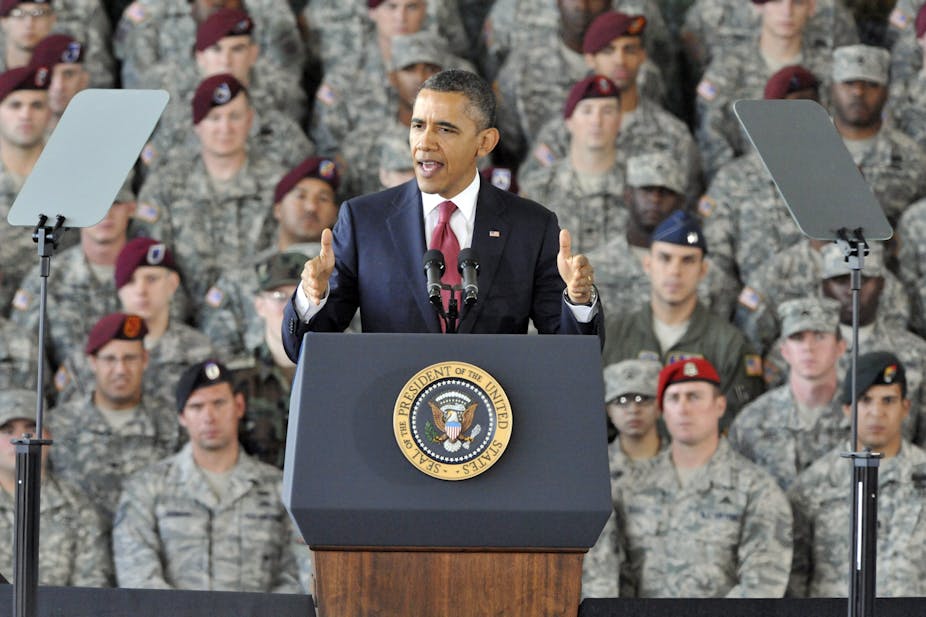Former US Secretary of State, Colin Powell, is reported to have advised President Bush concerning his planned invasion of Iraq that, “you break it, it’s yours.” The implication was that America would be responsible for restoring Iraq to political, social and economic health following the invasion.
President Obama appears to believe the United States have, indeed, repaired that broken country. Welcoming home from Iraq troops of the 82nd Airborne Division Obama claimed, in words reminiscent of former Vice-President Cheney, “We are leaving behind a sovereign, stable and self-reliant Iraq, with a representative government that was elected by its people.”
A grim reality
Rousing though Obama’s words may have been, the reality in Iraq is less rosy, with significant challenges facing the country. Some of these challenges are old. Others have developed as a result of the American invasion.
One result of the 2003 invasion was the enhancement of Iran’s place in the region. Over two years, the Bush administration removed two of Iran’s most serious threats – Saddam Hussein in Iraq and the Taliban in Afghanistan – without Iran having to raise a finger.
The enhanced Iranian influence will be one of the most important factors in Middle East politics for some years to come. The regime of Nouri Al-Maliki is well-disposed towards Iran. He and many other Iraqi politicians were given refuge in Iran during the Saddam years. There is also a wellspring of good-will among Iraqi Shi`a towards their co-religionists in Iran. We can expect to see increased closeness in Iraqi-Iranian regional policies over coming years – Al-Maliki’s support for Syria’s Bashar Al-Assad may be part of this process.
Iran won the war, but could it lose the peace?
On the other hand, there will always be a distance between Arab Iraqis and Persian Iranians, reflecting the region’s history of rivalry. Moreover, the Iranians might overplay their hand in an attempt to maximise their influence in Iraq. There are reports, for example, that Iran wants to install in the Iraqi holy city of Najaf a senior Ayatollah (a Marja) who supports the concept of velayat–i-faqih (rule by jurist/clergy).

This would be a challenge to Ayatollah Sistani, the leading and widely respected Shiite cleric in Iraq, who subscribes to the “quietist” school of Shiism, rejecting involvement of the clergy in politics. Such a step would be unwelcome in Iraq.
Old enmities remain
Iraq’s invasion of Kuwait in 1990 was meant to have been resolved by the American invasion. However, old issues dividing Iraq and Kuwait have begun to resurface. Iraq has accused Kuwait of attempting to block its access to the Persian Gulf and is demanding reconsideration of the five per cent of oil revenues that it must pay Kuwait in reparations for the 1990 invasion. Iraq’s representative to the United Nations recently said that his government does not accept the border imposed on Iraq after the 1991 war.
The Kurds were major beneficiaries of the US invasion and US support led many Kurds to hope for independence or effective independence from Iraq. The Al-Maliki government, however, has been attempting to increase Baghdad’s control over the Kurdish region. Tensions have been growing along the line between Kurds and Arabs and these have been aggravated by attempts by both parties to control the Kurdish region’s oil resources.
The situation has become highly volatile with the decision of Exxon-Mobile to conclude a number of exploration agreements with the Kurdish government, including in contested areas.
The US leaves with Sunni-Shi`a relations under pressure. Al-Maliki has taken a harsh line towards the Sunni and excluded them from important areas of state activity. Members of tribal groups that helped the US defeat the Al-Qaida insurgency have not been incorporated into the security services but remain armed and frustrated.
A democratic Iraq? Maybe not
Iraqi democracy is receding in the face of Al-Maliki’s consolidation of power and parliament’s fragmentation into traditional tribal and communal groupings. The situation in Iraqi Kurdistan is little better with old tribal rivalries reasserting themselves. Chaney once suggested a pro-US dictator would be the best result in Iraq. He may get his dictator, if not a pro-American one.
The Iraq fiasco has led to a decline in US influence across the region and to increased instability. Saudi-Iranian rivalry is sharper, communal tensions in Lebanon have increased and fear of Shiite influence throughout the region is dominating governments’ thinking.
Perhaps the most hopeful aspect of the Iraqi condition is that it will be some time before Iraq is able to threaten any of its neighbours and that economic rebuilding will be at the top of the government’s priorities. Otherwise, Obama’s words sound rather hollow.

